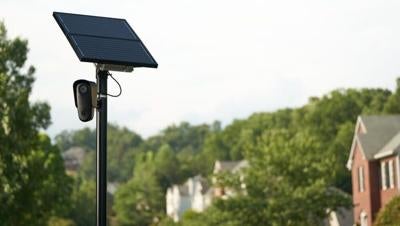NPD working on policy for new FLOCK cameras
Published 10:36 am Thursday, December 29, 2022

- The NPD is currently drafting a policy for its new FLOCK cameras. (Photo courtesy of Flock Safety)
|
Getting your Trinity Audio player ready...
|
The Nicholasville Police Department (NPD) is developing a policy for the FLOCK license plate reader (LPR) cameras. Until then, the NPD will use its ethical computer usage policy to govern its LPR usage guidelines.
As a reminder
In a Monday, December 12 meeting, The Nicholasville City Commission announced its plan to implement eight LPR cameras around the city. However, because this program is still in its implementation phase, NPD has only installed three LPR cameras. One is on Brannon Crossing, another on U.S. 27 and one on Main Street.
As a reminder, FLOCK LPR cameras take photos of car license plates and cross-reference them with license plate numbers associated with crimes.
The policy
Public Information Officer, Sam Wade, said that the NPD is “late to the game.” They’re looking to use the tool to locate missing persons, wanted persons, and stolen vehicles.
NPD Major Michael Fleming is doing the majority of writing for the policy. But, according to Wade, it will be a few more weeks until the policy is ready for department use.
Wade said that for the policy, Fleming will be drawing resources from agencies like the Kentucky League of Cities and cities that have already implemented the cameras- like Lexington.
Lexington has used FLOCK cameras for more than a year, and its city council voted to expand the program on Tuesday, December 8, for 75 more LPR cameras for 100 total.
In March 2022, Civiclex, Lexington’s nonprofit civic organization, reported on the Lexington Police Department’s (LPD) LPR camera policy.
According to Civiclex, at LPD, The FLOCK system stores the information for 30 days before it is deleted. Before the 30-day period ends, LPD can transfer any relevant information from the FLOCK database to LPD’s evidence unit.
LPD also has specific guidelines that officers must follow. Entries to the system are limited to the Intelligence Unit. Any sworn officer can perform a search but must provide a valid reason. Civilians are also entitled to request records if they are involved in a specific crime or investigation.
What is the Ethical Computer Usage Policy?
This policy is a set of guidelines for using department computers (stationary and mobile), the internet, and e-mail.
According to the policy, all employees share responsibility for protecting the NPD computer system from abuse.
The following is a non-exhaustive list of prohibited uses:
• Attempting to access files other than one’s own without permission.
• Using the computer system to send or receive messages that may indicate or suggest pornography, unethical or illegal solicitation, racism, sexism or inappropriate language.
• Theft – the use and distribution of illegally copied software, intentionally damaged software, files or equipment.
• To operate a business for personal financial gain, asking for money for political or religious organizations, or anything unrelated to the business of the city of Nicholasville.
• Creating or using software designed to destroy data and/or disrupt services.
• Accessing/downloading information that may violate the department’s sexual harassment policy.
• Violating the privacy rights of the agency, other employees and citizens of Nicholasville.
• Providing access to confidential information through the internet, e-mail or online services.
Failure to comply with the NPD ethical computer usage policies could result in facing discipline at any level, up to and including termination.


